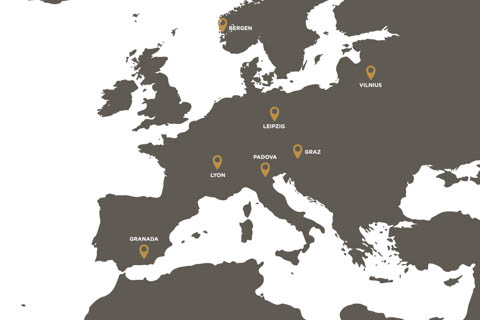 |
Faculty
Kaunas Faculty |
|

|
Scope of studies and length
210 ECTS credits, 4 years |
|

|
Qualification awarded
Bachelor's degree in Social Sciences |
|

|
Application deadline*
1 May / 1 July |
|

|
Language
English |
|

|
Tuition fee per year
4 000 € |
|

|
Start of studies
1 September
|
 |
City
Kaunas |
APPLY NOW
The Economics and Management programme provides students with theoretical and practical knowledge in economics, management, business and risk management, which is highly valuable for general management positions. The students build knowledge in the functioning of the economic system, develop skills in the assessment and forecasting of economic phenomena and market changes, the implementation of sustainable development principles, the use of economic and financial analysis methods in decision-making, the application of digital and business analytical tools, and the preparation of managerial tools.
Programme structure
| Course unit title |
ECTS
credits
|
|---|
| Course unit title |
ECTS
credits
|
|---|
|
1 semester
Compulsory courses
Academic and Information Literacy
English for Specific Purposes C1 I/II
Fundamentals of Finance
Microeconomics
Management
|
30.0
30.0
5.0
5.0
5.0
10.0
5.0
|
|
2 semester
Compulsory courses
Basics of Accounting
English for Specific Purposes C1 II/II
Macroeconomics
Mathematics
Course unit (module) of Individual Studies
|
30.0
25.0
5.0
5.0
10.0
5.0
5.0
|
|
3 semester
Compulsory courses
Economic Statistics
History of Economic Thought
Marketing
Decision Theory
Course unit (module) of Individual Studies
|
30.0
20.0
5.0
5.0
5.0
5.0
10.0
|
|
4 semester
Compulsory courses
Econometrics
Urban and Regional Economics
International Economics
Management Economics
Course unit (module) of Individual Studies
|
30.0
20.0
5.0
5.0
5.0
5.0
10.0
|
|
5 semester
Compulsory courses
Energy Economics
Welfare Economics
Corporate Finance
Tax System
Optional Courses
Financial Markets and Financial Institutions
Project Management
Course unit (module) of Individual Studies
|
30.0
20.0
5.0
5.0
5.0
5.0
5.0
5.0
5.0
5.0
|
|
6 semester
Compulsory courses
Environmental Economics
Economic Analysis
Change Management
Digital Economy
Human Resource Management
Optional Courses
E-business
Public Communication
|
30.0
25.0
5.0
5.0
5.0
5.0
5.0
5.0
5.0
5.0
|
|
7 semester
Compulsory courses
Quantitative and Qualitative Methods in Economics
Strategic Management
Business Analytics
Course Work
Optional Courses
Group I
Labour Market Management
Investment Management and Analysis
Group II
Family Business
Knowledge Management
|
30.0
20.0
5.0
5.0
5.0
5.0
10.0
5.0
5.0
5.0
5.0
5.0
5.0
|
|
8 semester
Compulsory courses
Bachelor Final Thesis (study field: Economics)
Internship
|
30.0
30.0
15.0
15.0
|
Key Learning Outcomes
The learning outcomes of the study programme conform to the main provisions of the qualification requirements of the social sciences study fields, job market demands, student expectations for the study process, and the relevance of the acquired skills in Lithuania and internationally.
The learning outcomes:
- analytical and critical thinking;
- ability to work individually and in a team;
- ability to communicate effectively and proactively, generate new ideas and provide reasoned justification for innovative solutions to business;
- ability to explain the categories, principles and methods of the economic sciences and to integrate knowledge in interdisciplinary studies and professional activities;
- ability to independently collect, organise and use qualitative and quantitative research methods to process information and statistical data reflecting the economic situation, analyse and forecast the organisation's economic and financial performance indicators;
- ability to develop managerial tools to implement the economic objectives of the organisation;
- ability to identify and solve financial management problems in an organisation by using theoretical knowledge of public financial management;
- ability to choose effective marketing activities to boost sales and ensure the competitive position of the organisation in the market;
- ability to assess the impact of human and social capital on the performance and development of an organisation, finding the best solution for stakeholders.
Programme Specific Requirements
- Matura (high school leaving) certificate
- Motivational interview
- Applicants from abroad who have not taken the national exams in their home countries must take an entrance exam
- English language proficiency at a level not lower than B2 (following the Common European Framework of Reference for Languages (CEFR)
In addition, all applicants have to fulfil the general admission requirements.
Why choose this programme?
-
The interdisciplinary nature of the speciality aligns with global trends in professional training, which emphasise the importance of integrating knowledge from different fields and the ability to create your own business. The programme trains economists with managerial competencies and is designed to provide graduates with comprehensive theoretical and practical knowledge for their working life.
-
The principles of the circular economy and business models based on the sharing economy are explored. The students also learn how to tackle the digital economy and build the skills for setting up and running their own businesses.
-
The problem-based teaching and learning methods help the students to develop digital, analytical, critical thinking and problem-solving skills in business planning, marketing and research; to advance their communication, cooperation and decision-making skills for effective management; and to foster creativity through project activities.
-
From semester 3 onwards, students can choose the subjects they want to study from a block of optional modules, increasing opportunities to deepen the desired competencies.
-
The study programme combines classical teaching methods with modern and interactive ones, including business analytics tools. In addition to the University lecturers, representatives of companies with extensive experience in economics, finance, and management also share their practical knowledge.
-
Opportunities for exchange studies and internships abroad (ERASMUS+ or other programmes).
-
The three-month professional practice in companies, organisations or public sector institutions helps to build the necessary skills to succeed as a business professional.
|
What comes after?
Graduates of the Economics and Management programme will be qualified to either set up their own businesses or work in a vast array of areas, such as:
- becoming economists or managers in the fields of finance, marketing, and human resources;
- becoming managers of an organisational unit in a company or the public sector;
- becoming middle managers or civil servants in a ministry, parliament, or government.
Graduates can pursue further studies in the Master's degree programmes in economics, business and management.
|


